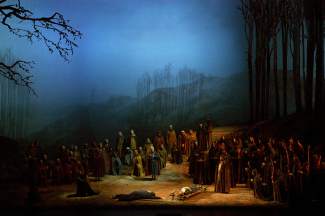Met Opera presents “Tannhäuser” broadcast in Breckenridge
Special to the Daily

Special to the Daily |
IF YOU GO
What: Met Opera Live in HD: Tannhäuser, Wagner
When: Saturday, Oct. 31, 10 a.m.
Where: Colorado Mountain College, Breckenridge
More information and tickets: http://www.nromusic.com/tickets-and-events/met-opera-live-in-hd/tannhauser/
The Metropolitan Opera presents Richard Wagner’s melodious opera, “Tannhäuser,” HD broadcast this Saturday, Oct. 31. In view of the opera length, the broadcast will begin at 10 a.m. Having been a Wagner opera fan for many years, this is the one opera I would recommend as an introduction for anyone new to his compositions. As Wagner himself proclaimed, “Tannhäuser is one continuous melody.”
The story is set in medieval Germany involving the spiritual progress and backsliding of Tannhäuser, a minstrel-knight who ran away from the community of knights at Wartburg. As portrayed in Act I, he had entered Venusberg, a pagan underground world of the goddess of love, Venus, to freely enjoy her lustful indulgences. In a vocal dialogue and duet, they proclaim love for one another, mirrored by dancers moving in the background semi-shadows of the grotto. Not long thereafter, Tannhäuser began to tire of Venus’ delights, dreaming of the real world he had left behind. Despite her protests, he leaves as the scene changes to find him back in the valley near Wartsburg Castle.
The role of Tannhäuser is performed by tenor Johan Botha, who in current reviews “sings the music with agility and beauty.” Venus is acted and sung by Mezzo-soprano Michelle DeYoung, who has been described as “relishing her role, singing with lustrous power.” She and Botha are intense and involved together in the Venusberg scene, matching each other’s abilities in their separate roles.
Act I ends as the scene changes to the valley above. Tannhäuser is seen viewing the passage of Pilgrims en route to Rome, as a shepherd plays a pipe and sings in the background. When kneeling in prayer before a wayside shrine, a hunting party arrives with minstrels, one of whom is Wolfram of Eschenbach, a former companion who recognizes Tannhäuser. When Wolfram mentions the name of Elizabeth, Tannhäuser’s past lover, he accepts the invitation to join their journey party on the way to the castle. The part of Wolfram is sung by baritone, Peter Mattei, whose voice is described as being “pure, beautiful and unadorned to near perfection.”
Act II opens in the Minstrels’ Hall in Augsburg, with Elizabeth, jubilant at the news of Tannhäuser’s return. Wolfram brings Tannhäuser in, joining with Elizabeth, who then together sing their song of love. The role of Elizabeth is sung by soprano Eva-Marie Westbroek, with a “richness of voice usually heard with mezzo-sopranos.” Wolfram, standing aside, realizes that he must forfeit his love for Elizabeth. An entourage arrives along with singers in preparation for the singing contest.
Wolfram opens the contest with an eloquent eulogy. Tannhäuser follows with a song in praise of love, guarded with hints of pagan sensuality. At the conclusion of the next song by Walther von der Vogelweide, Tannhäuser rises in protest. He is charged with being a blasphemer and is challenged to combat. Elizabeth intercedes to protect Tannhäuser, who begs her forgiveness. He is next banished from the scene, with only one hope — to join the pilgrims on their way to Rome, as their departing voices are heard in the distance.
Act III opens with Elizabeth lying in prayer near a roadside shrine. In the distance is heard the approaching pilgrims singing the famous “Pilgrim’s Chorus.” When they arrive, she sifts through the rows of pilgrims but Tannhäuser is not among them. In distress she leaves after offering a prayer to the Virgin that in death she may win forgiveness for Tannhäuser. As an observer, Wolfram sings the famous song to the Evening Star.
Soon Tannhäuser returns in anguish, relating to Wolfram that he had not received the Pope’s forgiveness of sins during his visit to Rome. As distant voices announce the death of Elizabeth, Tannhäuser dies in Wolfram’s arms. Not all is lost as a few pilgrims arrive, one announcing the miracle that the pope’s staff that had burst into bloom indicating Tannhäuser’s forgiveness.
In a review of the opening performance, James Levine as conductor was commended for “leading the singers and orchestra in a warm yet driven performance, giving each singer the opportunity to shine, pushing the orchestra forward when the emotions were agitated, and laying back with what felt like exquisite timing.” This is a performance not to be missed.
Snacks and beverages will be served during each of the two intermissions.
The Met Opera is a partnership between Colorado Mountain College and the National Repertory Orchestra. Elmer Koneman is a volunteer and opera enthusiast; Cecile Forsberg is the artistic and operations director with the NRO.

Support Local Journalism

Support Local Journalism
As a Summit Daily News reader, you make our work possible.
Summit Daily is embarking on a multiyear project to digitize its archives going back to 1989 and make them available to the public in partnership with the Colorado Historic Newspapers Collection. The full project is expected to cost about $165,000. All donations made in 2023 will go directly toward this project.
Every contribution, no matter the size, will make a difference.







